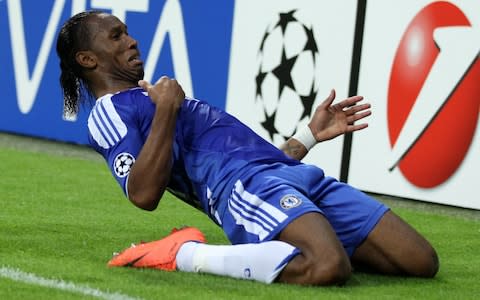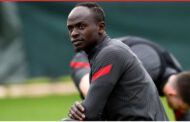Didier Drogba’s eye was drawn towards the chocolate Nutella gnocchi as he glanced at the menu and sat down in a Chelsea hotel to explain why, aged 40, the time was right to announce his playing retirement.
“I could have had two of these while I was playing,” said Drogba with a smile. “You can treat yourself when you are training, but now I’m going to have to be careful.”
Drogba instead opted for a coffee, as he spent almost an hour discussing a career that started and finished late, taking in eight clubs, seven different countries, 15 winners’ medals and was touched by a piece of divine intervention during Chelsea’s 2012 European conquest.
The late equaliser and winning penalty against Bayern Munich in the final of the Champions League, which proved to be the last kick of his first eight-year spell at Chelsea, in many ways characterises the fairy-tale nature of Drogba’s story.
But it is God who Drogba credits for the moment that will live with him for ever, saying: “I had some conversations with God on the pitch and that night I challenged Him and said ‘OK, if you really exist, now show me’.
“That’s how that goal came. On that last corner, I was telling God ‘now I want to see that you really exist’. So, when I scored and I ran to the corner flag, and I was looking to the sky, I was lost, I was saying ‘he does really exist’.
“That’s me and my faith, and my connection with God. That’s the only way I can explain what happened because there was no way we were going to go to Bayern Munich in front of their fans, losing 1-0, I score the equaliser, give away a penalty that Petr Cech saves, then the last kick and I score. It could have been a movie and it’s something I will never forget.”
Drogba’s determination to achieve his dreams was first tested as a 16-year-old, five years before he signed his first professional contract, when his father, Albert, stopped him from playing football to concentrate on his studies.
“When I was not studying well, my dad would stop me from playing,” said Drogba. “For him, football was not as important as school. Now, everyone is pushing their kids to become football players. But my dad was like ‘no, it’s not a secure job, you get injured and you lose everything’.
“He stopped me for a year. I was 16 and if I kicked a ball it was when I was hiding. But I’m a dreamer. No matter what you say to me, if I have an ambition to do something, I will do anything to get there and that’s what I did.
“I had to be smart, so the best way was to work well at school, please my dad and keep him happy. And then I went to him and said ‘there’s a football team there, I just want to go and play one sport’. He said ‘OK, go’. So, I went back to the club and I went back to him and said ‘I’ve found my sport, it’s football’.”
It still took until Drogba was 22 and had forced his way into the first team of Ligue 2 club Le Mans that Albert changed his mind over his son’s football career.
But the real turnaround came during a three-year period in which Drogba earned a move to Marseille from Guingamp and then, in 2004, joined Chelsea, where he overcame an initial fear of failure.
“When I left Marseille, 2½ years before I was a substitute in the second division in France,” said Drogba. “I scored six goals in five months. We go to the first division and play well for a year and a half, the season after you play for Marseille, the biggest club in France, and after another year ‘boom’, they take you to Chelsea, a club who became one of the biggest in the world. And I was like, ‘hmm, is it not too fast for me? Can I make it?’ I was a bit scared to fail because everything went so fast.”
Despite scoring 16 goals and helping Chelsea to their first top-flight title for 50 years during his first season at Stamford Bridge, Drogba had to be talked out of returning to Marseille by former manager Jose Mourinho.

Drogba said: “It was a difficult year, coming to Chelsea, and I was like ‘I’m not happy here, maybe it’s not for me and maybe I need to go’. But he was saying ‘No, you have to stay, I will help you, you must stay’.
“I was looking for that comfort zone, which means going back to Marseille, which means being the only striker and the team is playing for you.
“Then I heard Mourinho say something really interesting to the whole team. He was saying ‘You know what, if you want to be the only king then go back to the team that you were playing for, scoring 100 goals or so. Go back there. But here, there’s 22 kings. So. you accept it, work together or you go. Go back to where you came from and be the only king where everybody is behind you’.
“Suddenly I thought ‘wow’. I knew I needed to improve and that’s what really challenged me, and it’s why I became the player that I was.”
Drogba added another two trophies to the 10 he won during his first eight years at Chelsea, when he returned for a season in 2014. Before his Stamford Bridge comeback, he guided Galatasaray to League, Turkish Cup and Super Cup success.
He retired from international football four years ago as the all-time top scorer and former captain of the Ivory Coast, who he helped qualify for the World Cup for the first time in the country’s history in 2006. It was following that qualification that Drogba was credited with playing a role in the nation’s ceasefire after five years of civil war.
Having finished his playing career at Phoenix Rising, with the club reaching their first play-offs by winning the American Western Conference, Drogba has not yet decided where the next stage of his life will take him. He will base himself in London and consider whether to move into management while continuing work with his Foundation that has opened its first school and launched a mobile clinic this year in the Ivory Coast.
Asked how Albert, now aged 72, responded to the news he would be announcing his retirement, Drogba said: “C’est bon mon fils, c’est bon. Ah, it’s good my son, it’s good.”














